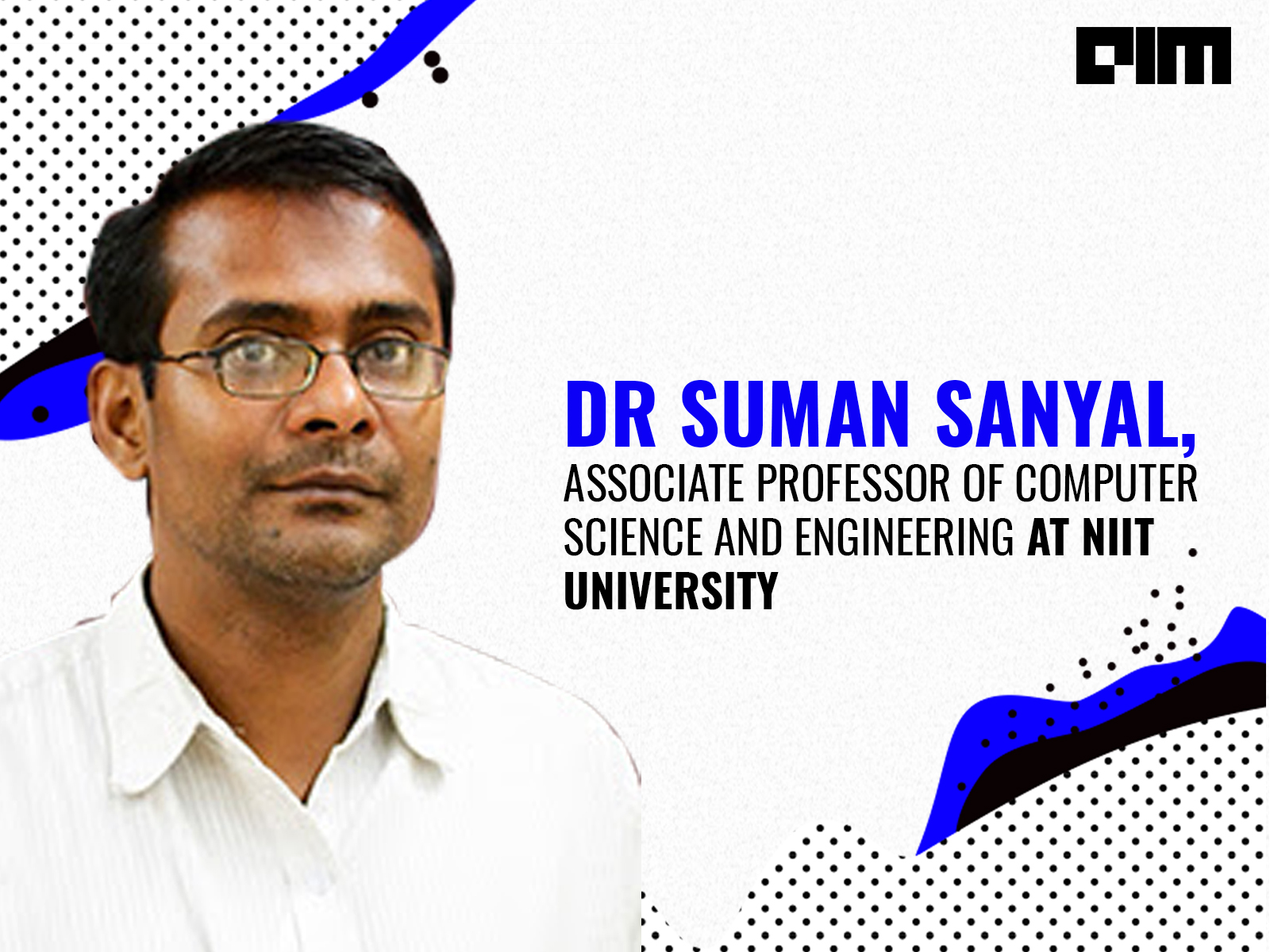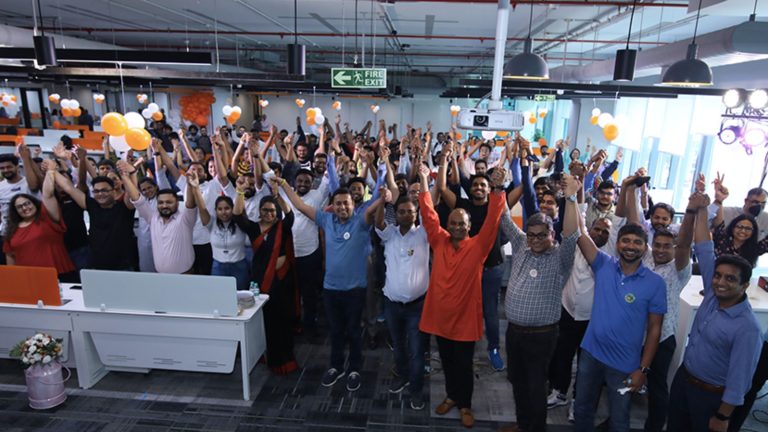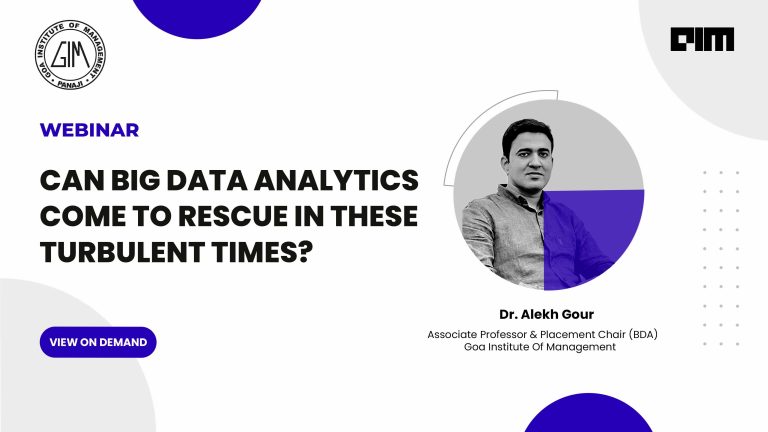For this week’s data science career interview, we got in touch with Dr Suman Sanyal, Associate Professor of Computer Science and Engineering at NIIT University. In this interview, Dr Sanyal shares his insights on how universities can contribute to this highly promising sector and what aspirants can do to build a successful data science career.
With industry-linkage, technology and research-driven seamless education, NIIT University has been recognised for addressing the growing demand for data science experts worldwide with its industry-ready courses. The university has recently introduced B.Tech in Data Science course, which aims to deploy data sets models to solve real-world problems. The programme provides industry-academic synergy for the students to establish careers in data science, artificial intelligence and machine learning.
“Students with skills that are aligned to new-age technology will be of huge value. The industry today wants young, ambitious students who have the know-how on how to get things done,” Sanyal said.
Excerpts:
AIM: What are the significant challenges a university faces in creating an industry-ready data science and analytics course? How did COVID impact the data science education market?
Suman Sanyal: The multidisciplinary nature of data science and analytics courses makes it tricky for a university in instrumenting a data science programme. Effectively bridging the gap between mathematics, statistics, computer science, and the necessary domain knowledge in pedagogy is key. That’s why, at NIIT University, we have a very effective program committee comprising experienced faculty members and industry experts who continuously monitor the architectures, content, and pedagogy of data science courses.
Lack of computing power, which are often expensive to maintain, can be another hindrance for the university. Also, lack of awareness about the proper mathematical foundation required for data science and analytics education is an issue.
The booster rockets of data science were fired before the COVID pandemic due to the requirement of a massive cut down of costs. However, post-COVID, as the focus on computing and dependency on data increased, what we are seeing is the firing of the main engine of data science. People, including those on the fence or even completely oblivious, seek out more and more data science courses.
AIM: What are your thoughts on the future of AI and analytics education in India?
Suman Sanyal: Post the pandemic, the demand for data scientists, along withother domains like data engineering, machine learning, business intelligence, and business analytics, is experiencing a massive soar in the country. This has forced the edtech companies to heavily invest in developing programs for machine learning and AI to keep up with the demand. Companies are leaning towards candidates who come from a multidisciplinary course than the narrow skilled ones.
AIM: What’s your advice for aspiring data scientists? What are the career prospects of an aspirant pursuing data science now?
Suman Sanyal: With the increased demand in the AI and automation sector, future jobs will require more multidisciplinary and technical skills in nature. To succeed in this demanding field of data, one has to build their data science competency. Quantitative professionals are currently critical in helping organisations navigate the pandemic crisis more effectively. Though other sectors have massively undergone salary cuts and lay-offs, the data science sector reversely experienced a rise in jobs creation.
Further, a wide spectrum of candidates can take up a career in data science, and there has been a soaring demand for data science roles over the last few years. But the supply of good and quality data scientists is growing at a much slower pace.
To manage the current disruption and move towards a ‘new normal,’ many companies use data science tools using ML algorithms and analytics. Digitisation has increased data sector jobs, where the industry is demanding skilled professionals who can analyse data to help companies navigate the new normal. Many young professionals are also opting for data science courses. This creates a perfect timeline for students and young professionals to embark on a career in data science.
AIM: How does an industry partnership add value to a university course?
Suman Sanyal: Over the years, NIIT University has been building extensive linkages with the industry. It has active collaboration with leading organisations like Thoucentric, Microsoft Research, IBM, WNS and PwC, Big Basket, etc. Industry partners form a part of our program committee that designs the course architecture and content that are most up to date. At NIIT University, the students also undertake Capstone projects in collaboration with our industry partners and in the eighth semester, they undertake a six-month industry practice.
AIM: What is NIIT University’s placement strategy for data science students?
Suman Sanyal: At NIIT University, our focus has always been to place students in industry practice based on their interest and specialisation related to the job description. We start the process from the first year itself, where we map the students’ interest and aspiration with their future career goals. This mapping is fine-tuned in the second and third year for students to get the best out of it when they come to the fourth year for placement. For our data science program, we partner with customer and customer services, and data-intensive consulting companies.
AIM: Do university-based professional degrees have an edge over online courses and MOOCs?
Suman Sanyal: While MOOCs have been an easy vehicle to deliver education, it cannot compete with a university-based professional degree. MOOCs may provide an easy ticket to data science; it fails to deliver real-time, industry exposure which one can get by enrolling for a professional degree. To be successful in data analytics, one needs to adhere to a well-structured curriculum that builds on the complexity of the subject and re-enforces continuous learning by implementing practical knowledge as well. And that can be provided by full-time professional degree courses.



















































































